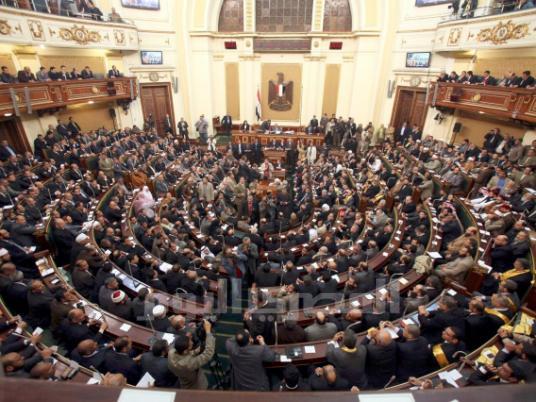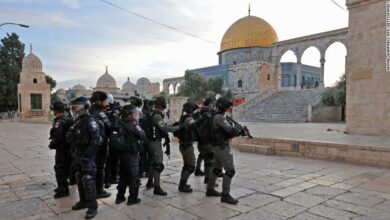
The inaugural session of Egypt’s first post-Hosni Mubarak People's Assembly kicked off on Monday with ultra-orthodox Islamists insisting on adding religious references to the official oath.
The first session started with the swearing-in of the assembly's 508 representatives. MPs had to swear to "to protect faithfully the country's safety, the republican regime, to take care of the people's interests and to respect the Constitution and the law."
As soon as his name was called out, Salafi lawyer Mamdouh Ismail stood up and held the microphone to recite the oath, but added at the end "as long as God's law is not violated."
The addition elicited a stir in the assembly's chamber and prompted MP Mahmoud al-Saqqa, who presided over the session by virtue of being the most senior lawmaker, to ask Ismail angrily to abide by the official text.
The conservative lawyer, who is famous for defending jihadists, refused to give in to the demand of the secular Wafd Party's leader, and repeated the oath with the same phrase. Many of these MPs came in traditional robes and white headscarves.
Later on, Adel Afify, the chairman of the Salafi-oriented Asala Party, along with several other bearded MPs who are believed to belong to Salafi-led Nour Party, followed in Ismail's footsteps. In some instances, the microphone was muted as soon as a lawmaker was about to pronounce the controversial addition.
Later on, another bearded MP asked the chair to order a recess for noon prayers. His demand was ignored.
The incumbent People's Assembly is marked by an unprecedented Islamist presence. More than 60 percent* of the 498 contested seats went to the Muslim Brotherhood's moderate Freedom and Justice Party and the ultra-conservative, Salafi-led Nour Party.
In the recent past, Salafis rejected democracy as a heretic Western invention and remained aloof from electoral politics. As soon as Mubarak stepped down, they formed several political parties whose manifestos recognized democracy as a mode of governance as long as it did not breach the Islamic Sharia. Some experts on Islamism contended that this shift is more of a tactical maneuver that aims at using democracy temporarily until they reach power and convert the political system to a theocratic rule.
Unlike Salafis, FJP parliamentarians, who occupy nearly 40 percent of the seats, adhered to the official oath.
Khalil al-Anani, an Egyptian political scientist at Durham University, hailed the FJP performance as "disciplined and professional so far."
"They act confidently as power holders and majority party," Anani said. The Muslim Brotherhood had endorsed democratic politics long ago and had run for Parliament since the 1980s.
Some non-Islamist MPs deviated from the stipulated oath in their own way. Ziyad al-Eleimy, a founder of the Revolution Youth Coalition and a lawmaker representing the Egyptian Bloc, a coalition of three secular parties, swore to "pursue the goals of the revolution inside the Parliament and stay faithful to the martyrs' blood."
Like several other MPs, Eleimy wore a yellow sash bearing the words, "I respect the objectives of the revolution. No to military trials."
Religious references are expected to get more intense as soon as parliamentarians begin the process of drafting the new constitution.
According to the temporary military-issued constitutional declaration, this Islamist sweeping majority will soon enough take the lead in electing the 100-member constituent assembly that will write the first post-Mubarak constitution. The secular minority fear that their conservative peers will use their parliamentary weight to design a constitution that could eventually turn Egypt into a religious state similar to Saudi Arabia or Iran.
The Muslim Brotherhood had sought to diffuse these fears by affirming its commitment to democracy and civil rule. Salafis might drag the FJP to the right end of the political spectrum.
*Correction: This article initially stated that nearly 75 percent of seats in parliament are controlled by the FJP and Nour Party.




